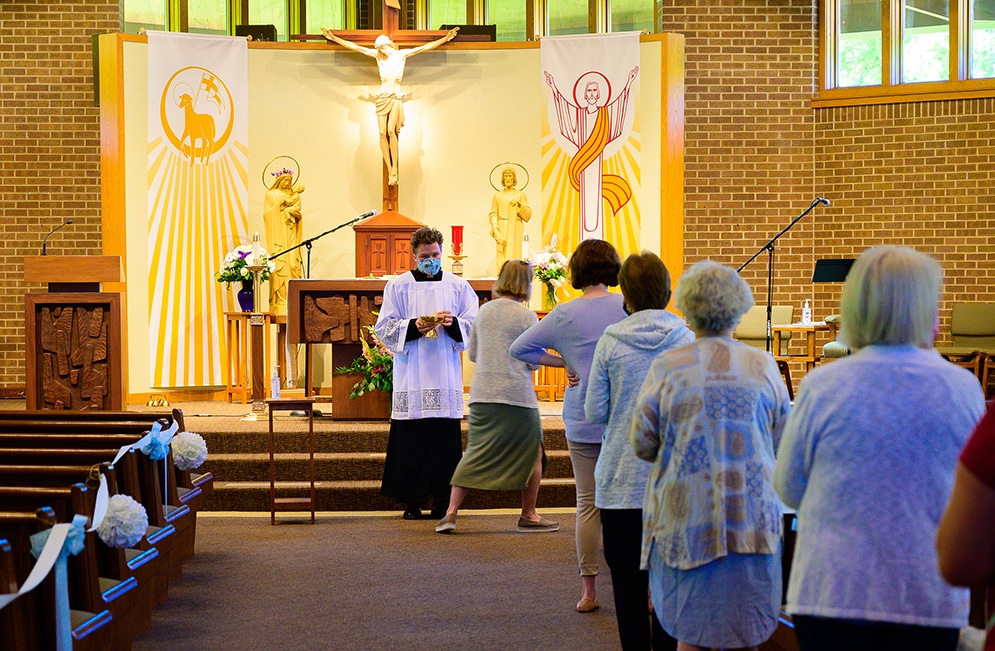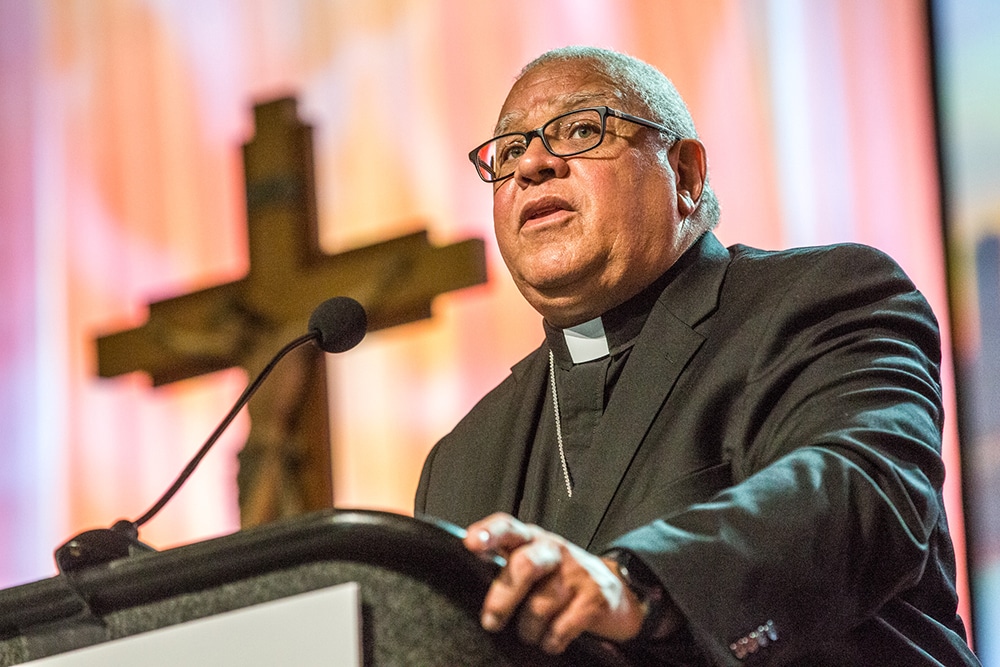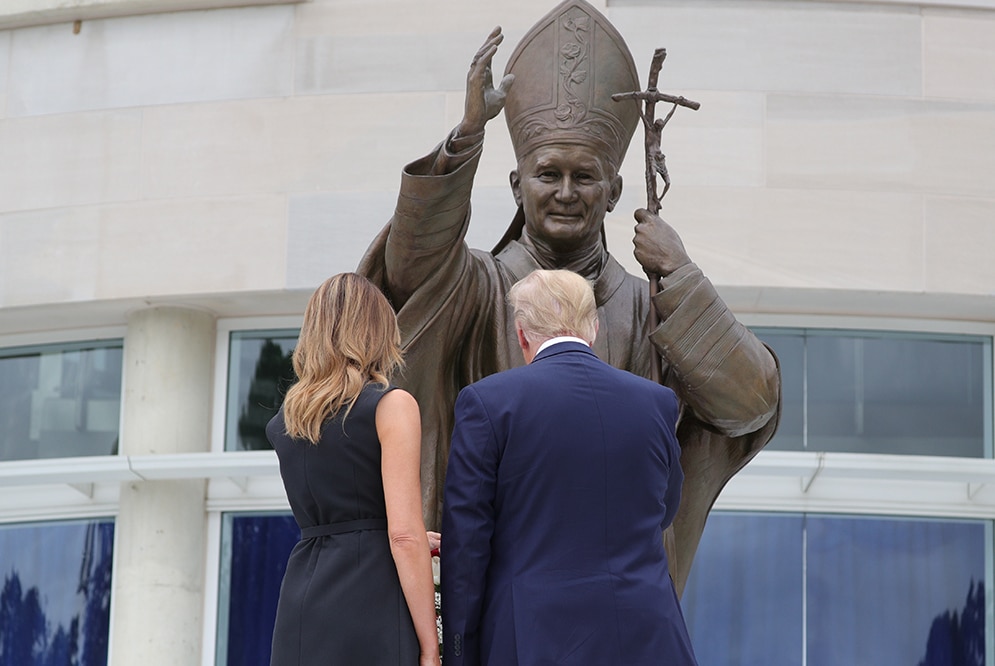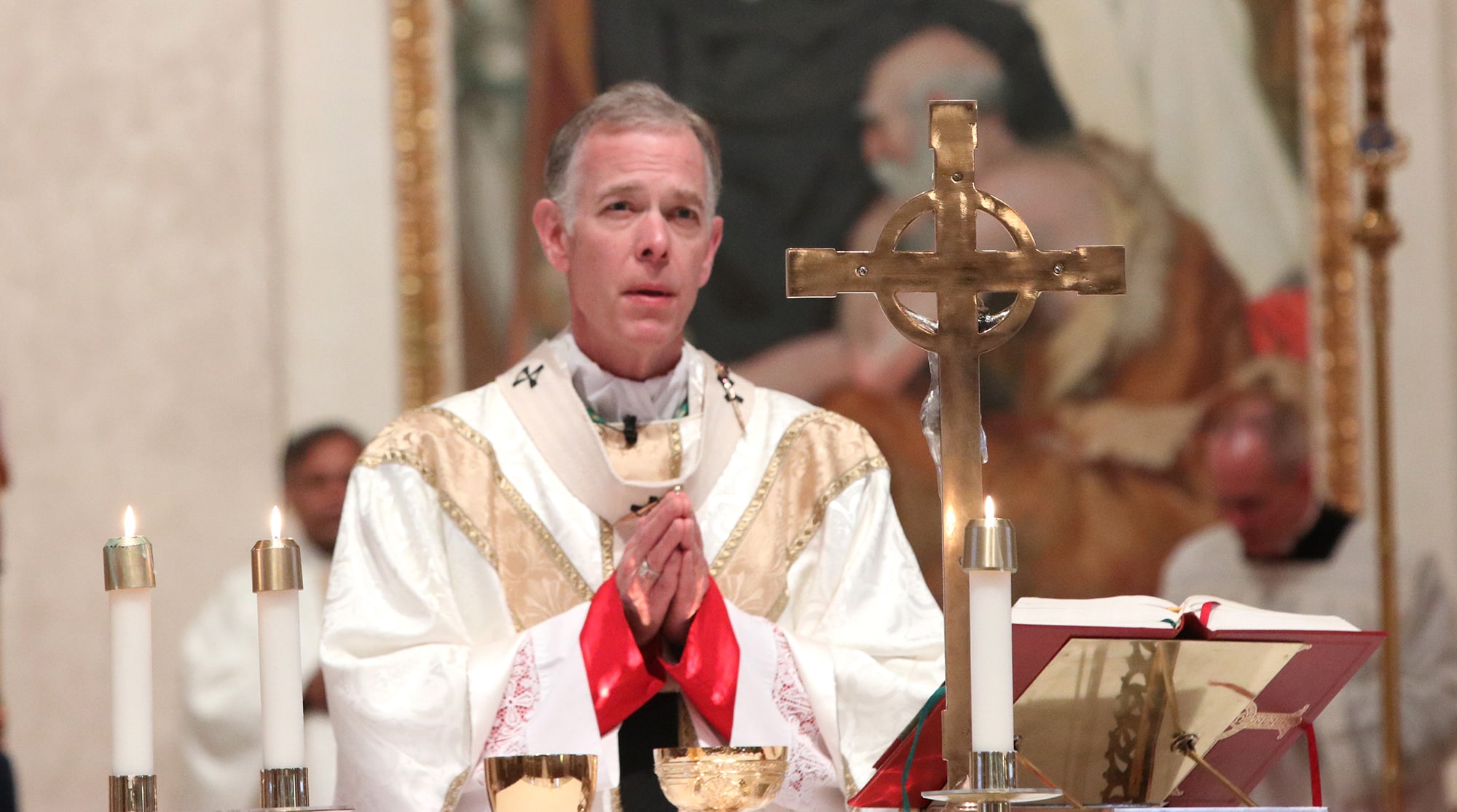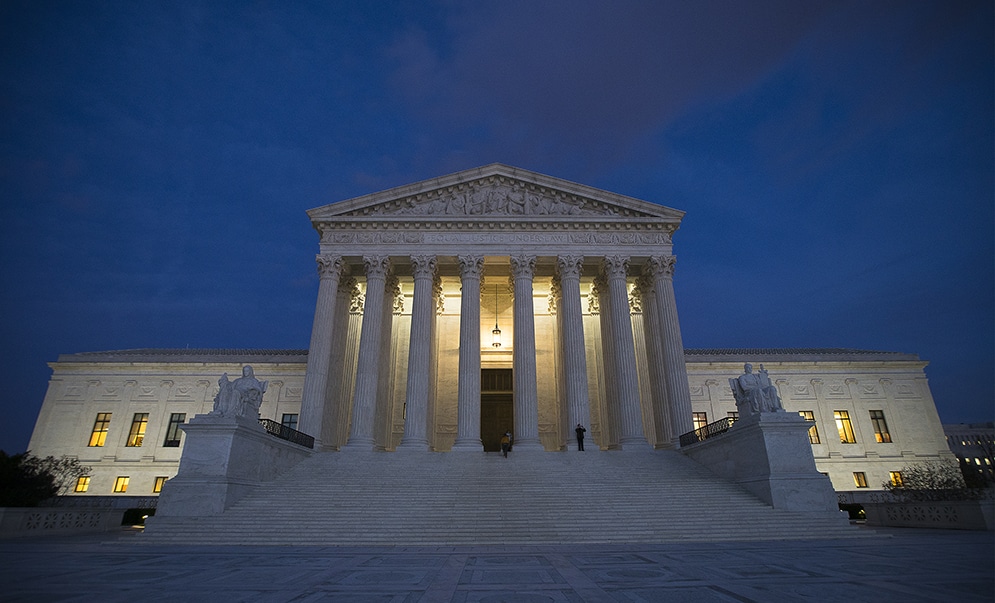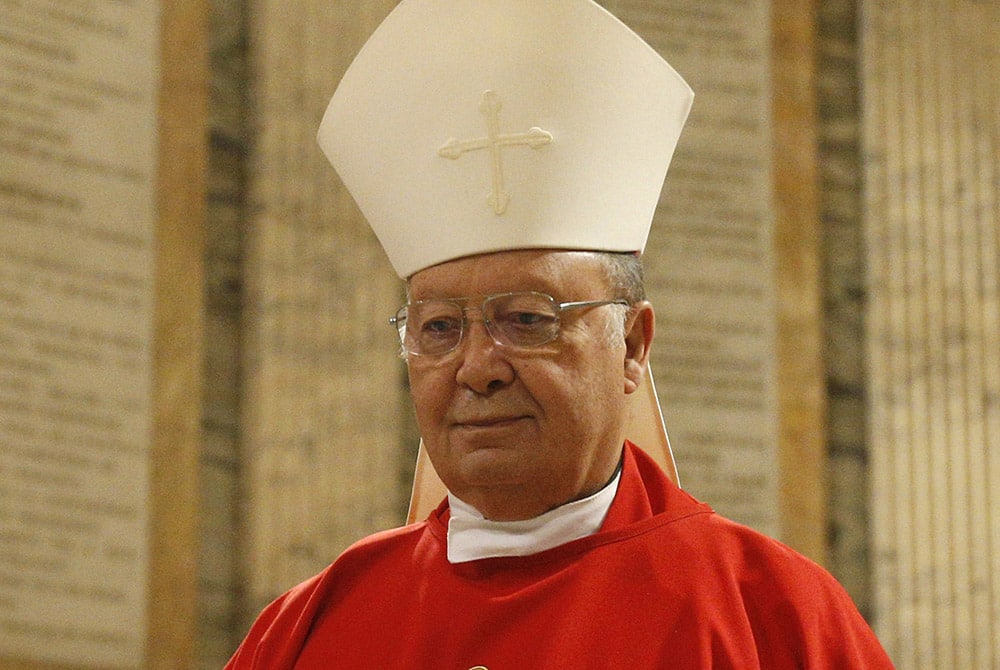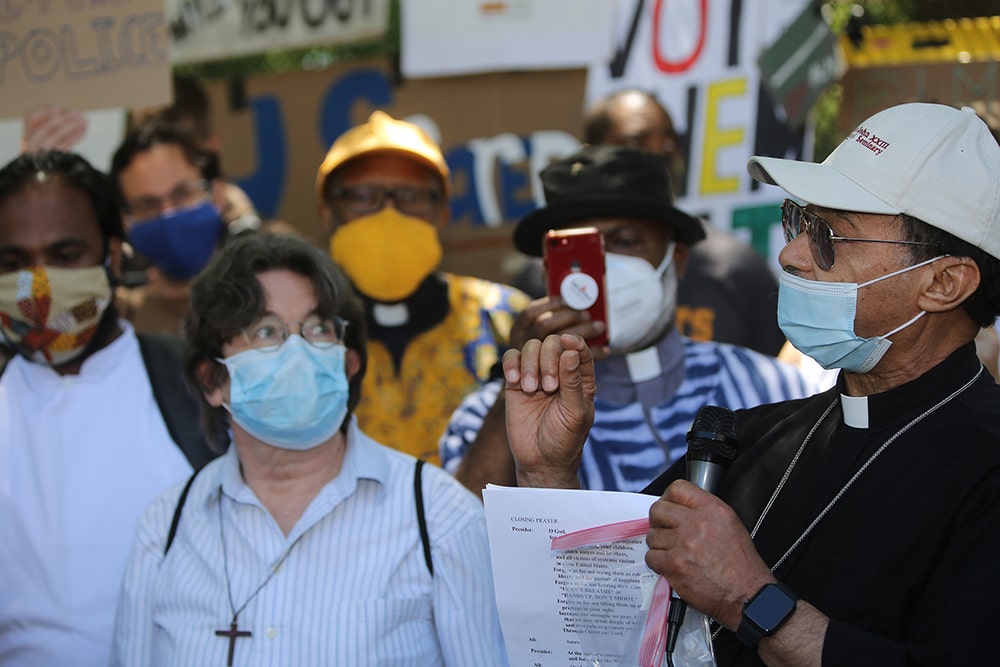Public Masses and religious gatherings were banned in Washington State for two and a half months until Gov. Jay Inslee announced new directives on May 27 to permit houses of worship to begin resuming public services.
About two weeks prior, the Archdiocese of Seattle had submitted its own church reopening plan amid the coronavirus pandemic. Auxiliary Bishop Daniel Mueggenborg said the archdiocese provided the plan to the governor’s office as a courtesy. He emphasized that the local Church was informing the governor, not asking him for permission.
“We are not negotiating for our rights,” said Bishop Mueggenborg, who told Our Sunday Visitor in a recent interview that “the constitutional rights of churches need to be considered on an equal par with other sectors of society.”
“We are desiring to be a team player and to do our part to ensure that we are well-coordinated, and that there is a very clear understanding among all parties as to how and when we can safely return to public worship,” Bishop Mueggenborg said.
That tension between public health directives aimed at slowing the spread of COVID-19 and the First Amendment rights of religious organizations is playing out across the country in meetings between bishops and elected officials in city halls, county commissions and governors’ offices.
‘Burden on worship’
Catholic bishops have collaborated with those civil leaders to protect public health. They willingly suspended public Masses when the pandemic began impacting the United States in mid-March. In most states, governors and Church leaders have coordinated well on shutdown and reopening plans.
But in some areas, government and Church officials have clashed. On June 3, the Diocese of Madison, Wisconsin, told local and county officials, in a letter through the Becket Fund for Religious Liberty, that it will file a lawsuit unless parishes are allowed to operate at the same capacity as retail outlets.
“Our diocese has been, and remains, committed to promoting and protecting the health and safety of our fellow Madisonians, but the county and city have wrongly subordinated the spiritual needs of the community to the operations of nonessential businesses,” Bishop Donald J. Hying of Madison said in a prepared statement.
About a week earlier, officials in Maryland’s Howard County had issued a public health order that would have prohibited the consumption of any food or drink during religious services, effectively banning the celebration of the Eucharist. The county withdrew that restriction after the Archdiocese of Baltimore expressed its concerns.
The most prominent church-state conflict related to the coronavirus to date happened last month when Minnesota’s Catholic bishops said they would resume public Masses on May 26 in defiance of Gov. Tim Walz’s guidelines that would have restricted religious services to 10 or fewer people while permitting restaurants, bars and retail stores to reopen at 50 percent capacity.
“The churches had been reaching out to the governor and saying, ‘Please work with us to reopen safely.’ They had submitted protocols to the governor based on guidance from the Centers for Disease Control, and they hadn’t heard anything back,” said Diana Verm, an attorney with the Becket Fund.
Walz issued a new order allowing for public religious services to resume after the Becket Fund notified him, in a May 20 letter on behalf of the Minnesota Catholic Conference and the state’s Lutheran Church, that those churches intended to resume in-person worship. The letter included a legal analysis that accused Walz’s order of violating protections afforded to religion under the federal and Minnesota state constitutions by singling out houses of worship for unfair treatment.
“If you’re imposing a burden on worship services but you’re saying it’s OK for people to fill shopping malls to 50 percent capacity, you have to explain, with a very good reason, why it doesn’t violate public safety to keep malls open while you keep the churches closed,” Verm told Our Sunday Visitor.
Having conversations
On a map tracking state-level reopening guidelines, the Becket Fund classifies 30 states as having no prohibitions on religious worship and 13 states that restrict church activities equally to how they restrict businesses and retail stores. The Becket Fund identifies eight states as either prohibiting religious worship or subjecting it to unequal treatment: California, Nevada, Oregon, Washington, Nevada, New York, New Hampshire and Connecticut.
In New York, Gov. Andrew Cuomo released guidelines in late May that only permit religious gatherings of up to 10 people. Church leaders in the state have presented their own reopening plans, but no firm timeline has been set for when larger public Masses might return in New York.
“We have had almost no conversation with the Cuomo administration, and this has been true of other faith traditions as well. It’s not a Catholic thing,” said Dennis Poust, the communications director for the New York State Catholic Conference. Poust told Our Sunday Visitor that while the state’s Catholic bishops do not see themselves in a dispute with the governor, the lack of communication has been “a source of frustration.”
“Certainly, many Catholics are anxious to get back to Church and are frustrated by the delay when they see an unlimited number of people going into Walmart or the neighborhood liquor store,” Poust said.
Further north on the I-95 corridor, Bishop Thomas J. Tobin of Providence, Rhode Island told Our Sunday Visitor that “there’s been a pretty good relationship” between his diocese and Gov. Gina Raimondo, who last month said churches could reopen with limited capacity on May 30.
“I think there’s an important distinction to be made. The government limited the practice of churches in this case for reasons of public health, which is a value we also share,” Bishop Tobin said. “We were not shut down because of doctrinal reasons or because they disagreed with something we were saying, doing or teaching, which would have been a much more serious situation.”
Even in circumstances where local and state governments are amenable to religious liberty concerns and encouraging of public worship, some Church leaders are making it a point to assert their First Amendment prerogatives.
“It was our decision [to resume public Masses] in order to maintain a proper and supportive boundary between church and state,” Bishop Michael F. Olson of Fort Worth, Texas, told Our Sunday Visitor a few days after public Masses were celebrated last month in his diocese for the first time since March.
In mid-April, Gov. Greg Abbott of Texas announced a phased reopening plan and deemed houses of worship as “essential services” that could reopen to the public as long as they maintained social distancing protocols. In regular discussions with public officials, Bishop Olson said he was careful not to be adversarial with the state, “but at the same time not to be subordinated to it, either.”
“We have to rely on the gift and wisdom of our American experiment when it comes to defending the Church’s space from the secular government,” Bishop Olson said.
‘Nobody wins’
Protecting the Church’s space from government overreach has been a top concern for bishops and other Church officials who over the last decade pushed back against intrusions such as a federal mandate that would have required religiously affiliated nonprofits to provide birth control and sterilization in employee health plans.
“There is always a risk that government officials will find it convenient to treat religion as a strictly personal, private matter,” said Richard W. Garnett, the founding director of the University of Notre Dame Law School’s Program on Church, State and Society
“However, we are fortunate that American traditions, and American laws, provide substantial protections for religious liberty, and these protections remain in place — and should be enforced by courts, if necessary — even in times of public health and other challenges,” Garnett told Our Sunday Visitor.
Verm, of the Becket Fund, said the Washington, D.C.-based public interest law firm is “keeping an eye on states that are holding out” on equitable reopening guidelines for churches and other houses of worship.
“There are still some states treating churches differently, and there are some (states) where even if the state government changes the rules, the local government continues to restrict churches,” Verm said.
While local and state governments have authority to shutter churches for building code violations and during emergency situations such as a pandemic, observers say governors are generally more reliant on religious leaders working with them to resolve issues such as protecting public health from COVID-19.
“The government’s working with us in a very good way and vice versa. If we don’t work together, then we have conflict like in other parts of the country,” Bishop Richard F. Stika of Knoxville, Tennessee, told Our Sunday Visitor.
Bishop Stika said local government authorities in East Tennessee amended a public health directive prohibiting Communion after he explained to them the centrality of the Eucharist to Catholic worship. He also worked with those authorities to resume public Masses on the weekend of Pentecost.
Said Bishop Stika, “When there is antagonism between the government and the Church, nobody wins.”
Brain Fraga is a contributing editor for Our Sunday Visitor.

